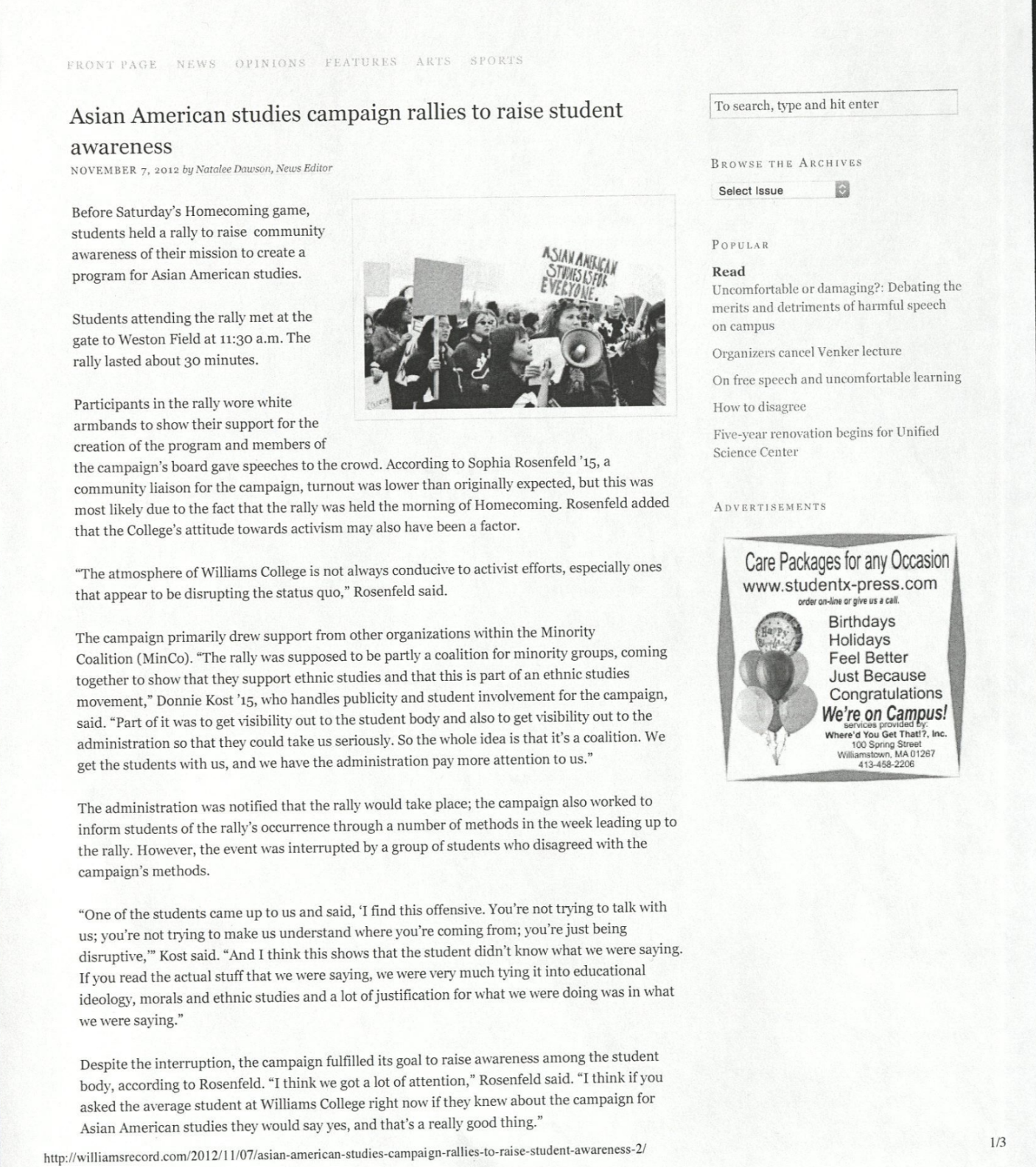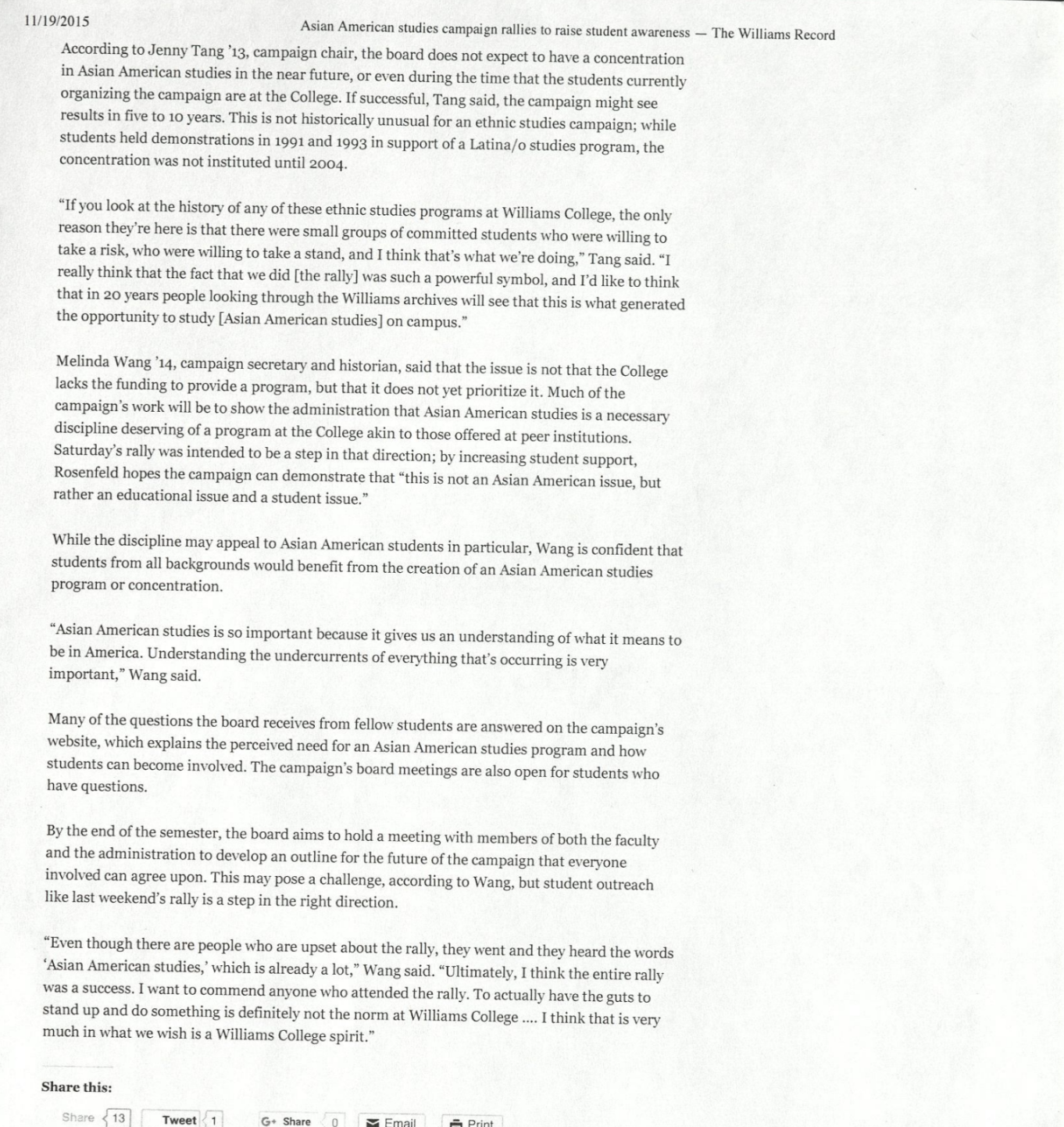October 31, 2012
BSU issues the following letter in support of Asian American Studies.
November 3, 2012
Members of the Campaign for Asian American Studies rally at Homecoming in support of the submitted CEP proposal for Asian American Studies. They delivered the following address:
1.
Hello everyone. Happy homecoming, and thank you for standing with us. Your presence shows a true commitment to the incredible liberal arts education we receive here at Williams. Today you are getting to the heart of what it means to be a student by actively engaging with the curriculum of our school.
Our goal is simple: To raise awareness in the college community about the need for an Asian American Studies concentration at Williams College. Asian American studies is a rich and growing academic field, one that helps us see what we commonly think of as the ‘American experience’ in a new light. Asians have lived in America for over one hundred and fifty years, and there are a breadth of complex relationships between individuals and communities both old and new within this century and a half. The term ‘Asian American’ is itself a fairly recent phrase, coined in the Third World movements of the late sixties and early seventies. It marks a turning point in the history of Asians in America: for the first time, Americans of Asian descent were naming themselves, choosing actively to take on an identity.
But while that early movement brought on a great onslaught of both activism and academic work in the field, being Asian in America is anything but simple. The development of Asian American studies has given birth to thousands of pieces of literature, new theories of identity, and community projects. Asian America comprises people from diverse ethnicities, languages, and classes, and its identity is constantly in flux.
There’s much more I want to tell you, but what I’m really trying to say is that there are a lot of ideas here, ideas that are worth studying in depth. Getting an Asian American studies concentration here at Williams is not an Asian American issue. It is an educational issue. It is a student issue. We look forward to having more conversations about the institution of an Asian American Studies concentration here at the school we love. Knowledge is power. Stand with us as we make our voices heard!
2.
It has become all too commonplace to remark on the insularity of our college. The so-called “Purple Bubble” is painted as an ivory tower divorced from the concerns of the real world. But we need look no further than our own curriculum to see that the education we receive at our beloved institution is in powerful and deeply entrenched ways shaped by the history and politics of America and the world. The contents of our education are politically informed, shaped by what is deemed “valuable” by history at any given time.
Asian American studies is valuable, and its absence in the college curriculum is unacceptable. To join the call for Asian American studies at Williams is to recognize that there is a very real gap in our college curriculum that must be addressed. We need Asian American studies NOW. Thank you for joining us!
3.
What is the purpose of a Williams education? This seems a particularly apt question on Homecoming Day, a day set aside for us to come together as a community and to celebrate the spirit and legacy of Williams. Our mission statement tells us that “welcoming and supporting … people from all segments of our increasingly diverse society” is a core value of the college. Today, we ask for you to think critically about what constitutes a holistic education, informed by Williams’ commitment to diversity. We believe that the lack of an Asian American studies concentration prevents Williams from fulfilling its promise to its students, as put forth in its mission statement. Our educations are sorely lacking. And by “our,” we mean every single student on this campus, regardless of race, gender or ethnicity.
Our Africana Studies concentration was established in 1969 and our Latino/Latina Studies concentration was established in 2004, both as the result of student activism. Our presence here today owes much to the legacy of that activism: to those who occupied Hopkins Hall in 1969 to demand Africana studies, to those who took over Jenness House and the Dean’s Office in 1988 to demand the establishment of a Multicultural Center and the hiring of more minority faculty, and to those who hunger striked in 1991 and 1993 to demand Latino and Latina studies. In short, no change has ever been effected at Williams without a group of committed students willing to take a stand. You being here means the world to our campaign.
We stand with you today, empowered by the past, engaged with the present, and excited for the future. Our call for Asian American Studies at Williams reflects our dedication to our mission statement, which asks us to “understand that an education at Williams should not be regarded as a privilege destined to create further privilege, but as a privilege that creates opportunities to serve society at large, and imposes the responsibility to do so. … Williams understands its own responsibility to contribute by thought and example to the world of higher education.” As Williams students, we take this call to heart. Williams needs Asian American studies. Today, like those who have acted before us, we will change the course of our college’s curriculum, not only for our generation, but for every student yet to come.
November 7, 2012
The Record releases the following article on the Homecoming rally.
December 12, 2012
An External Review of Williams College's American Studies department conducted by professors from University of Washington, University of Michigan, Amerhst College, and University of Massachusetts unanimously finds the lack of an Asian American Studies program to be glaring and problematic.
April 2013
The Committee on Educational Policy establishes a cluster for Asian American Studies, but does not approve the hiring of any additional Asian Americanists nor the establishment of Asian American Studies. The CEP splits into the Committee on Educational Affairs (CEA) and the Curricular Planning Committee (CPC).


